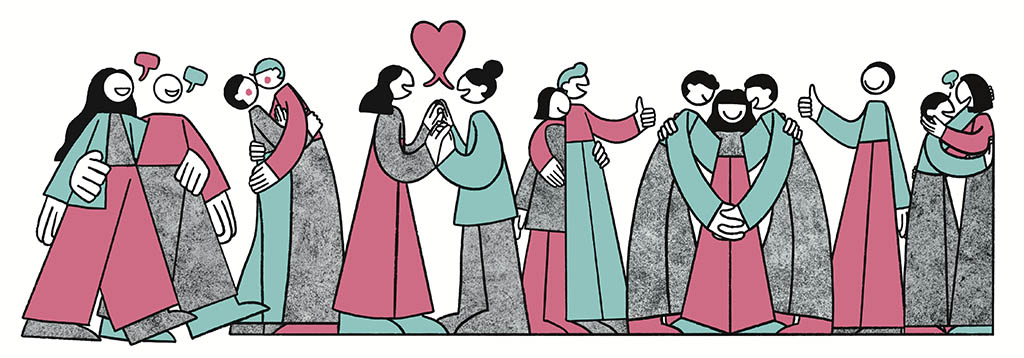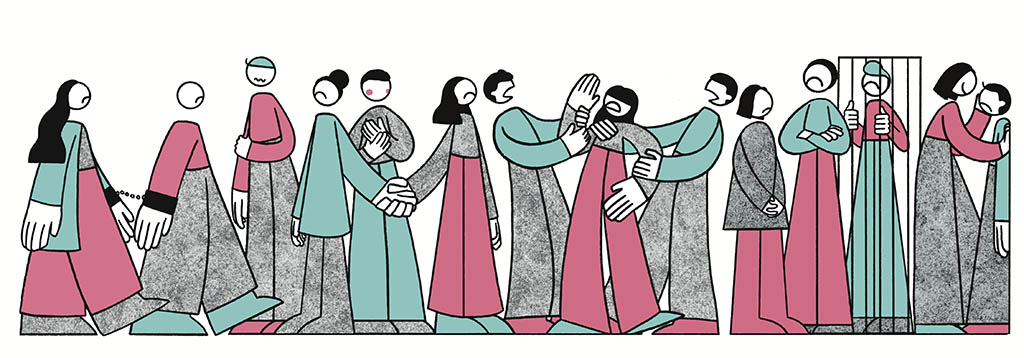Monogamous, polyamorous, or an open relationship: how do Tilburg students view love?
We listen en masse to songs about broken hearts, read books about complicated love relationships, and feast on romantic comedies. But what does it really mean to “love”? And is there a single definition of love? Univers asked Tila Pronk, assistant professor of social psychology and love scientist, and spoke with three students about their love lives: one polyamorous, the other monogamous, and a doubter.

Love comes in all shapes and colors and is a popular topic of conversation. Also among young people. But how do we love anno 2022? A recent survey by EenVandaag (in Dutch) shows that 42 percent of Dutch young people believe that humans are naturally monogamous (exclusive), 39 percent think not. Almost a quarter think an open relationship suits them, in which you can kiss, date, or have sex with someone else in addition to your regular partner. In addition, 13 percent of young people say they are polyamorous: they can be romantic and intimate with multiple partners at the same time.
How do students from Tilburg view different forms of relationships and love? These are the words of Tila Pronk, Wietske Petrişor, Judith Zijdenbos, and Sam de Smet.
Tila Pronk, assistant professor of social psychology and love scientist
“Different forms of love such as monogamy, polyamory, and an open relationship are of all times. Yet it was always a taboo to talk about these openly. Nowadays, that is different. In recent years, the subject is no longer taboo. There is more talk and writing about it in the general media. In addition, it is striking that many young people no longer want to compartmentalize. For example, they are increasingly questioning notions such as ‘typically masculine’ or ‘typically feminine.’ This social development also affects the way young people define their relationships: they are less naturally monogamous. They feel more freedom to figure out who they want to be and how they want to love.
“People in monogamous relationships are just as happy as those in polyamorous ones”
Tila Pronk
“Science has long ignored non-monogamous relationships. Nowadays, scientists are paying more attention to it and trying to investigate the quality of these relationships. In fact, there are quite a few preconceptions about non-monogamous relationships. For example, people think that you only fall in love with someone else if your current relationship is not good. As it turns out, it’s complete nonsense!
“In fact, research shows that there is no difference in quality: people in monogamous relationships are just as happy as those in polyamorous ones. However, it is very important that the relationship is transparent, and partners communicate clearly with each other. Not knowing what your partner is doing can lead to insecurities and jealousy. In the end, clear agreements and communication skills are the best strategy to keep a relationship healthy and sustainable.”
Wietske Petrişor, philosophy student and polyamorous oriented
“For me, love is in many things, and if I describe it, I am necessarily shortchanging it. I can feel love for persons, moments, ideas, and nature. Love for me is a personal, intimate, and unique experience that I share with someone else. I do not want this experience to be influenced by societal structures and expectations.
“Sincere connections and intimacy are very important to me. For me, that is a prerequisite for a good love. In addition, clear communication is essential. For example, I don’t want to burn bridges and break friendships because my lover is jealous. That is an absolute limit for me. Conversely, of course, the same applies. As long as my partner and I continue to communicate to each other that our relationship is good, we do not question our love. By the way, I don’t condemn jealousy. I just don’t want that emotion to guide decisions we make about our relationship. Rather, I talk about it, so we can make arrangements that we both feel comfortable with.
“Currently I am dating two individuals. I notice very clearly that they both have a completely different but very positive effect on my life”
Wietske Petrişor
“That this way of loving is not the standard, I experience every day. I had a valuable conversation with my grandmother about this. I told her that I do not think about love in a traditional way, and that I can love several people at the same time in a romantic and committed way. I asked her what I should do: adapt or choose my own path? Then she told me something that has stuck with me immensely: “Your polyamorous experiences are still new to society. Society still has to get used to the idea that there are other forms of love. With same-gender relationships and gender identity, it also took a while for them to be more accepted. That’s a process, but that doesn’t mean you have to adapt. Your love is allowed to exist.’ That insight gave me self-confidence.

“Monogamy is still the norm. It’s as if there is a handbook describing exactly how citizens should behave according to monogamous norms and values. That doesn’t work for me; I’m someone who likes to figure that out for myself, without picking up that handbook and behaving accordingly.
“Currently I am dating two individuals. I notice very clearly that they both have a completely different but very positive effect on my life. I find that very valuable. By the way, this does not mean that polyamory is the best choice for everyone. But when people have the opportunity to figure it out for themselves, it gives them more room to discover which form of love suits them best.”
Judith Zijdenbos, communications student, and convinced monogamist
“I notice that people often talk about love full of praise. I find that strange, because in my eyes it’s not all roses. Love also brings out the nastiest sides in people. Sayings like ‘love is blind,’ or ‘love is a strange disease’ are there for a reason, of course. When I look around me, I see many people struggling with jealousy. In addition, many are stuck in toxic relationships. And then you have those people who are obsessed with the person they ‘love.’ Love, in my opinion, is often misinterpreted. Also, look at great literary masterpieces: the love between Romeo and Juliet is not romantic and fairytale-like. It’s a frightening idea to die for love, isn’t it? What do people find beautiful about that? Rather, I find it tragic.
“Of course, love also has a very beautiful side. It sometimes feels very intense and familiar. Because of this, the small moments take on a lot of meaning. My boyfriend and I have a monogamous relationship, and I am very happy. This does not mean that we are always all over each other. I think it is important that we do not merge into a single couple but remain two autonomous individuals. We always try to stimulate each other and bring out the best in each other. Sometimes this also means that you have to be self-effacing so that the other gets more space to develop.
“I think it is important that we do not merge into a single couple but remain two autonomous individuals”
Judith Zijdenbos
“The reason we have a monogamous relationship has nothing to do with an aversion to polyamorous relationships. I know many people who are polyamorous, and I also see that it works. But I don’t see myself loving multiple people at the same time right now. The relationship with my boyfriend is fulfilling enough.
“In addition, I would like to have children and I don’t think I can reconcile this vision of the future with polyamory. It feels more stable to share my desire for children with one partner. Regarding this, I am still a bit traditional. This is not to say that polyamorous people are better off not having children. I just don’t know any polyamorous couples with children whom I could take as an example. Because of this, a monogamous relationship still feels a bit like the ‘safe path.’ The fact that I currently feel no need to share my life with anyone else also helps, of course.”
Sam de Smet, third-year student and doubter about love
“Love for me is something ‘warm’ to give away. It’s about caring and looking out for each other. So an ultimate feeling of protection. But in romantic love there is a core of doubt for me; then suddenly I don’t know how to define it so easily. This has everything to do with my self-confidence. When something becomes ‘romantic,’ I can suddenly doubt whether I am enough. All these doubts and insecurities make me feel neither really monogamous nor polyamorous.

“I have a lot of love to give, and I can love people very much. Sometimes almost too much for one person. So I look up to polyamorous people very much. To my mind, they are generous in many ways. Their positive attitude to life appeals to me. It seems wonderful to be so free and live in the moment. In addition, I admire their communication skills; as an outsider, they seem to experience no jealousy and have no secrets. That transparency suits me. I also want to carry life so ‘lightly.’ But wanting and being able are two different things.
“It’s almost religious: what’s the point of life if that love isn’t there?”
Sam de Smet
“Indeed, in a certain sense, monogamy also suits me. There is an intimate desire in me to meet a soul mate. I very much want to belong to one person and experience a kinship in terms of friendship, orientation, and intimacy. But there is immediately another side to that that I like less; to ‘possess’ love. I find that possessive side less charming. It remains a quest to get it clear in my mind.
“There is no one in my area in a relationship that I would want as an example. In my view, these relationships are all unsustainable. But even though I don’t see any aspiring relationships in my environment, I do believe that my ideal love exists. It is almost religious: what is the point of life if that love isn’t there?”
Translated by Language Center, Riet Bettonviel






